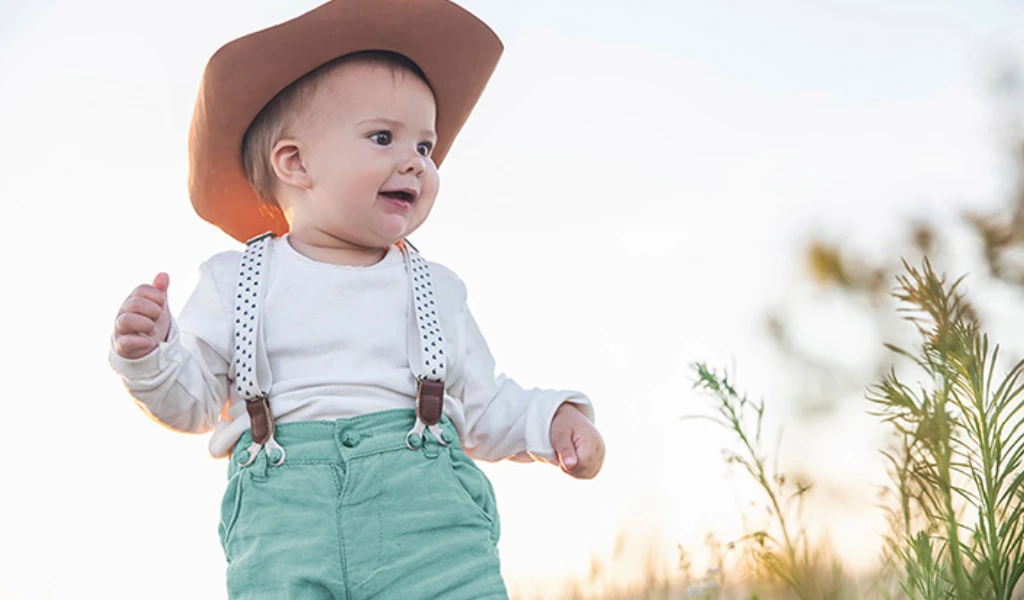Names that show where someone’s family comes from or the natural features of an area, with a nod to the beauty of the environment.
Prior to the 19th century, Swedish surnames or last names were not common because they were based on the father’s name or paternal ancestor’s surname. This system involved adding a prefix or suffix to create a new surname for the next generation. However, soldiers, clergy members, and nobility started using non-patronymic surnames. Around the late 19th century, surnames started changing to reflect where a person lived or their occupation. In the 17th and 18th centuries, middle-class individuals began adopting ornamental surnames made up of two parts, with the first part usually being a farm name or a geographical feature. Check out our list of Swedish surnames or last names and their meanings in this post.
Famous Swedish Surnames Or Last Names With Meanings
1. Abramson
This Swedish surname means ‘son of Abram or Abraham from the Bible’ and is a different form of the surname ‘Abram’ passed down from a father to his son.
2. Ahlberg
This Swedish last name from Sweden is made up of the words ‘al,’ which means ‘alder,’ and ‘berg,’ which means ‘mountain.’
3. Ahlgren
This Swedish last name is made up of the words ‘al,’ which means ‘alder,’ and ‘gren,’ which means ‘branch.’
4. Ahlin
The surname is Swedish and is made up of the words ‘al,’ meaning ‘alder,’ and ‘in,’ from the Latin word ‘inus’ or ‘inius’ meaning ‘descendant of.’ It could have originated from a topographic description, inspired by a significant alder tree nearby.
5. Ahlman
This is a decorative Swedish surname made up of the prefix ‘al,’ which stands for ‘alder,’ and ‘man,’ which means ‘man.’ In several parts of Germany, it is known as a topographic last name that refers to a person who lives in a swamp.
6. Ahlquist
This decorative Swedish last name is made up of two words, ‘al’ meaning ‘alder,’ and ‘quist,’ an old version of ‘kvist,’ meaning ‘twig.’
7. Ahlstorm
The surname is decorative, made up of ‘al,’ representing ‘alder,’ and ‘storm,’ referring to ‘river.’
8. Akerman
This Swedish last name is of Swedish origin and is a variation of Ackermann. It is made up of the word ‘aker,’ which translates to ‘field,’ and ‘man’ which means ‘man.’
9. Akerson
This Swedish last name is part of a few Swedish names that end with ‘son’ but does not indicate a father’s name. Instead, it is a decorative name made up of ‘aker’ which means ‘field’ and ‘son’ which means ‘son.’
10. Almstedt
The Swedish surname ‘Almstedt’ comes from the Swedish words for ‘elm’ and’town.’
11. Andersson
The Swedish last name Andersson comes from the Greek name Andreas, which means ‘man’ or ‘manly.’ It signifies being the son of Anders or Andrew. In Sweden, Andersson is a very popular Swedish surname.
12. Allinder
This surname is popular in Sweden and is made up of two parts: ‘al,’ for alder, and ‘aner,’ meaning man in Greek.
13. Alvin
This is a fancy Swedish surname made up of the parts ‘alv,’ which means ‘elf,’ and the ending ‘in.’
14. Ameen
The surname is of Swedish origin. The first part’ame’ may refer to a place. The second part’en’ comes from the Latin word’enius,’ which means ‘related to.’
15. Anderberg
The last name is decorative and made of two parts – ‘ander,’ which likely comes from the Greek word ‘andros’ meaning ‘man,’ and ‘berg,’ meaning ‘mountain.’
16. Anfinson
An often seen last name in Sweden and Norway, this surname comes from the words ‘arn’ (for eagle) and ‘finnr’ (for Finn, the Finnish people).
17. Angermanland
The Swedish last name is a shorter version of the Latin name ‘angermannius,’ which refers to a man from Angermanland.
18. Ansell
This Swedish surname is a combination of the names ‘ans’ and ‘ell,’ where ‘ans’ likely refers to a location and ‘ell’ is a suffix originating from the Latin word ‘elius’.
19. Aslin
This Swedish surname comes from the words ‘as,’ which means ‘ridge,’ and ‘lin,’ a common ending in Swedish surnames.
20. Asplund
This fancy Swedish last name comes from the words ‘asp,’ which means ‘aspen,’ and ‘lund,’ which means ‘grove.’
21. Axelson
The Swedish surname ‘Axelson’ comes from the Norse name ‘Axel,’ meaning ‘divine source of life.’
22. Backlund
The Swedish surname ‘Buckland’ is decorative and is made up of two parts: ‘back,’ which translates to ‘hill,’ and ‘lund,’ which means ‘grove.’
23. Backman
The Swedish surname ‘Beckman’ is decorative and combines the words ‘back’ (referring to a hill) and ‘man’ (meaning a person).
24. Beckius
This is a decorative Swedish surname made up of the words ‘back,’ which refers to ‘stream,’ and ‘ius,’ a suffix that is commonly used.
25. Bergdahl
The Swedish surname ‘bergdal’ combines the words ‘berg’ (meaning mountain) and ‘dal’ (meaning valley).
26. Berggren
The last name from Sweden is made up of two parts: ‘berg,’ which stands for ‘mountain,’ and ‘gren,’ which represents ‘branch.’
27. Bergstedt
This fancy last name from Sweden is made up of the words ‘berg,’ meaning ‘mountain,’ and ‘stedt,’ which might be a place name.
28. Bergsten
It is a decorative Swedish last name made up of the words ‘berg,’ which means ‘mountain,’ and ‘sten,’ which means ‘stone.’
29. Bergstrand
Bergstrand is a Swedish surname that potentially has multiple origins and meanings. The surname ‘Bergstrand’ is a combination of the words ‘berg,’ meaning mountain, and ‘strand,’ meaning shore.
30. Birger
The Swedish last name from Sweden comes from the first name ‘Birger,’ which means ‘someone who rescues, defends, or assists.’\
31. Bjorklund
This last name comes from a place where ‘bjork’ means ‘birch’ and ‘lund’ means ‘grove.’
32. Bjornberg
This is a fancy Swedish surname that means ‘bear mountain.’
33. Bjurstrom
This decorative Swedish surname comes from the words ‘bjur’ meaning ‘beaver’ and ‘strom’ meaning ‘river.’
34. Blaustein
This Swedish last name comes from German roots and has two parts. The first part, ‘blau,’ means ‘blue,’ while the second part, ‘stein,’ means ‘stone.’
35. Blixt
It could be used as the surname for a soldier or as a decorative name. This Swedish surname means ‘bolt of lightning.’
36. Blomberg
It is a decorative last name, with ‘blom’ representing ‘flower or bloom’ and ‘berg’ meaning ‘mountain.’
37. Blomgren
This Swedish last name is made up of two parts:’blom,’ which means’flower or bloom,’ and ‘gren,’ which means’branch.’
38. Boberg
The surname ‘Boberg’ comes from the words ‘bo’ meaning ‘dwelling’ and ‘berg’ meaning ‘mountain.’
39. Bodeen
This surname comes from the word ‘bod,’ meaning a small hut and the suffix’en,’ which represents’genius’ in Latin. It could also indicate a place where someone lives.
40. Bolling
It is a fancy surname made up of ‘boll,’ which means ‘belonging to,’ and the ending ‘ing.’ It could also be a name based on a place where someone lives.
41. Boman
It might be a fancy surname because it combines the words ‘bo,’ which means ‘dwelling,’ and ‘man,’ which means ‘man.’ It could also be a last name based on someone’s location, indicating they lived on a remote homestead.
42. Branting
This Swedish surname may have originated from a place where people lived. The word ‘brant’ refers to a steep hill, and ‘ing’ is a typical ending for Swedish last names.
43. Bratt
This Swedish last name comes from an ancient Norse name ‘Brattr’ which means ‘majestic’ or ‘proud’.
44. Broberg
This surname is a combination of two parts, ‘bro’ which means ‘bridge’ and ‘berg’ which means ‘mountain.’
45. Brunell
It is an decorative surname made up of the word ‘brun’ which means ‘brown,’ and the ending ‘ell’ that comes from the Latin word ‘elius.’
46. Callander
This might be a version of the name ‘Karl,’ which means ‘man,’ combined with ‘ander,’ a decorative ending stemming from the Greek words ‘aner’ or ‘andros.’
47. Carby
This might be a name for a place where people live in Sweden. It comes from the words ‘karl,’ which means ‘freeman,’ and ‘byr,’ which means’village.’
48. Cederholm
The surname ‘Cedarholm’ is decorative and combines the words ‘cedar’ and ‘island.’
49. Clarin
The surname ‘Clarin’ may have originated from ‘klar,’ which means ‘clear,’ and the suffix ‘inus’ comes from Latin meaning ‘descendant of.’
50. Cornell
This Swedish surname comes from Latin and means ‘horn.’ It could also be a last name used by soldiers.
51. Cronquist
The last name is decorative and is made up of ‘kron,’ which stands for ‘crown,’ and ‘quist,’ an old form of ‘kvist,’ which means ‘twig.’
52. Dahl
The last name is common in Sweden and comes from an ancient Norse word meaning ‘valley.’ One famous person with this last name is Roald Dahl, known for writing books such as Matilda and Charlie and the Chocolate Factory.
53. Dahmen
The last name is made up of two parts. The first part, ‘Dahm,’ might be a location name, and the ending ‘en’ comes from the Latin word ‘enius,’ which means ‘related to.’
54. Dahlberg
This Swedish last name is also a decorative name. The first part, ‘dal,’ stands for ‘valley,’ while the second part, ‘berg,’ stands for ‘mountain.’
55. Degn
This Swedish last name comes from a job name ‘degn,’ meaning ‘deacon,’ which comes from the Latin word ‘diaconus,’ meaning ‘servant.’
56. Ekholm
This fancy surname is made up of two parts: ‘ek,’ which means ‘oak,’ and ‘holm,’ which means ‘island.’
57. Ekbald
The name ‘Oakleaf’ is a decorative name made up of the words ‘ek,’ which stands for ‘oak,’ and ‘blad,’ which means ‘leaf.’
58. Ekstrand
This fancy surname comes from the words ‘ek,’ which stands for ‘oak,’ and ‘strand,’ which means ‘shore.’
59. Eld
This last name from Sweden comes from the Old Norse name ‘eldr,’ which translates to ‘flame’ or ‘fire.’
60. Elg
The Swedish last name is decorative and comes from the word ‘alg’, which translates to ‘moose’.
61. Eliasson
This is a name that comes from ‘Elias,’ a name used by a prophet in the Bible.
62. Elm
The surname is decorative and comes from the word ‘alm(e),’ which refers to a group of elm trees.
63. Enberg
This name might be for decoration because it comes from the words ‘en,’ which means ‘juniper,’ and ‘berg,’ which means ‘mountain.’
64. Eriksson
It is a Swedish last name that comes from the father’s name Erik. The name Eric is made up of ‘ei,’ meaning ‘one, alone, unique,’ and ‘rikr,’ which means ‘king’ or ‘ruler.’
65. Fager
This is likely a fancy surname or a variation of another name. It translates to ‘attractive’ or ‘pretty.’
66. Fahlgren
This surname is a combination of the words ‘fal,’ which refers to a plain or open space, and ‘gren,’ which means branch, used for decoration or living purposes.
67. Ferm
This surname might come from a Swedish word meaning ‘farm,’ which can also mean ‘prompt’ or ‘ready.’
68. Flink
The Swedish surname ‘flink’ translates to ‘quick,’ ‘agile,’ or ‘nimble.’ It may have been a name used by a group of peasants who served in the army and passed down to their descendants.
69. Floren
This fancy surname comes from the word ‘flor,’ which means ‘flower’ and the suffix ‘en’ comes from the Latin word ‘enius,’ which means ‘related to.’
70. Grahn
There are two possible explanations for the surname ‘Grahn.’ One is that it comes from the word ‘gran,’ meaning ‘spruce.’ The other is that it could be named after a specific location called Gran.
71. Granat
This surname might come from the word ‘granat,’ which means ‘grenade’ or ‘shell,’ and could be used by a soldier.
72. Grendahl
The Swedish surname Grenadahl is decorative and consists of two parts. The first part, ‘gren,’ translates to ‘branch,’ while the second part, ‘dahl,’ means ‘valley.’
73. Gullickson
This last name comes from the personal name ‘Gullik’, which originated from the Old Norse name ‘Gudleikr’ made up of ‘gud’ meaning ‘God’ and ‘leikr’ meaning ‘fight’ or ‘struggle’.
74. Gunnarson
Gunnarson is a last name that comes from the first name ‘Gunnar,’ which originated from an Old Norse name Gunnarr. Gunnarr is made up of the parts ‘gunn,’ meaning ‘battle,’ and ‘arr,’ meaning ‘warrior.’
75. Hagberg
This might just be a fancy surname made up of the words ‘hage,’ which means ‘enclosure,’ and ‘berg,’ which means ‘hill.’
76. Hammar
This is a surname that comes from a place called ‘hamarr,’ which is an Old Norse word meaning ‘crag’ or ‘cliff.’
77. Hassel
This Swedish surname may come from the Swedish word ‘hassel,’ meaning ‘hazel,’ as a decorative choice. It could also be a surname based on a place with the term ‘Hassel.’
78. Hedberg
This decorative Swedish surname is made up of two parts: ‘hed’ means ‘heath’ or ‘moor,’ and ‘berg’ means ‘hill.’
79. Helen
This surname is a decorative Swedish name made up of the words ‘hall,’ meaning ‘rock’ or ‘stone,’ and the suffix ‘en,’ which comes from the Latin word ‘enius.’
80. Hannson
This last name comes from the first name ‘Hans,’ which means ‘the Lord is gracious.’ Hansson means ‘son of Hans.’
81. Ingerman
This Swedish surname originates from a region called Ingermanland (Ingria), located between Finland and Russia.
82. Isberg
This fancy surname combines the words ‘ice’ and ‘mountain.’
83. Jansson
This Swedish surname comes from the first name ‘jan, which is a short form of ‘Johannes.’
84. Johansson
This is a very common Swedish last name, second only to Anderson. It is a name that means ‘son of Johan’, following the tradition of using the father’s first name as a last name.
85. Kallgren
This fancy surname is made up of the parts ‘kalla,’ which translates to ‘spring’ or ‘source,’ and ‘gren,’ which means ‘twig.’
86. Kalmar
The Swedish last name comes from a place called ‘Kalmar,’ a seaport across from Oland island.
87. Karlsson
This last name is frequently found in Sweden and is a name that indicates someone is the son of Karl. It can also be spelled as Carlsson.
88. Kindell
The last name comes from the word ‘kind,’ meaning ‘family’ or ‘tribe,’ and the ending ‘ell’ comes from the Latin word ‘elius.’
89. Kjellberg
The surname ‘Kallaberg’ is made up of the words ‘kalla,’ which translates to ‘spring,’ and ‘berg,’ which means ‘mountain.’
90. Kronholm
The name is decorative and is made up of the words ‘kron,’ which means ‘Crown,’ and ‘holm,’ which means ‘inlet’ or ‘island.’
91. Kvistad
This surname may have originated from the place Kvistad or it could be a decorative name made up of the words ‘twig’ and ‘town.’
92. Lagergren
This decorative surname is made up of the parts ‘lager,’ which stands for ‘laurel,’ and ‘gren,’ which stands for ‘branch.’
93. Landberg
This fancy Swedish surname is made up of two parts. The first part, ‘land,’ means ‘land,’ and the second part, ‘berg,’ means ‘hill’ or ‘mountain.’
94. Landin
This last name from Sweden has two parts: ‘land’ which means ‘land’ in English, and a suffix commonly used in Swedish last names coming from the Latin word ‘inius,’ which means ‘descendant of.’
95. Levander
This last name from Sweden has a variety of different origins. One explanation is that a priest from the 19th century chose an ornamental name inspired by his home farm, Hjartungen, where ‘Hjarta’ means ‘heart’ and is translated as ‘lev’ in Hebrew. The suffix ‘ander’ comes from the Greek word ‘andr’ which means ‘man.’ Another explanation is that it comes from Levene, a location in the Vastergotland region.
96. Liden
It is a fancy surname made up of two parts; the first part ‘lid’ means ‘hill,’ and the ending ‘en’ comes from the Latin word ‘enius.’
97. Lilijedahl
The Swedish last name is made up of two parts: ‘lilije,’ which means ‘lilly,’ and ‘dahl,’ an earlier version of ‘dal,’ which means ‘valley.’
98. Lindbeck
The Swedish surname ‘Lindbeck’ comes from the words ‘lind,’ meaning lime tree, and ‘beck,’ meaning stream.
99. Lindborg
This surname is decorative and is made up of the words ‘lind,’ which refers to a lime tree, and ‘borg,’ which means ‘castle’.
100. Lindgren
The name ‘Lindgren’ is decorative and comes from the words ‘lind’ meaning ‘lime tree’ and ‘gren’ meaning ‘branch’.
101. Lundeen
This last name from Sweden is a fancy name made up of the word ‘lund,’ which means ‘grove,’ and the ending ‘een’ comes from the Latin word ‘enius.’
102. Lundholm
The last name is decorative and comes from the words ‘lund’ which means ‘grove’ and ‘holm’ which means ‘island.’
103. Mahlberg
The first part of this last name could come from a fancy version of the word ‘mal,’ which means ‘gravel’ in a place name. The second part, ‘berg,’ means ‘mountain.’
104. Malmberg
The fancy surname ‘Malmburg’ comes from the words ‘malm’ (ore) and ‘berg’ (mountain).
105. Mathiason
This surname comes from ‘Mathias,’ which is the Swedish version of ‘Matthew.’ It is a surname based on the father’s first name.
106. Moberg
This is a fancy name or a surname based on the landscape made up of the words ‘mo,’ which refers to ‘sandy heath,’ and ‘berg,’ which means ‘mountain.’
107. Mogren
The name is decorative and made up of the words ‘mo,’ which refers to ‘sandy heath,’ and ‘gren,’ which means ‘branch.’
108. Mossberg
This fancy Swedish last name is made up of the words ‘mosse’ that refers to ‘peat bog,’ and ‘berg’ that means ‘mountain.’
109. Naslund
This name is decorative or related to a specific location, made up of the words ‘nas,’ meaning ‘narrow strip of land,’ and ‘lund,’ meaning ‘grove.’
110. Nordin
More than 10,000 people in Sweden have this surname, which is a typical Swedish last name. The name was created by combining the words ‘nord,’ meaning ‘north,’ and ‘in,’ which comes from the Latin word ‘inius’ and means ‘descendant of.’
111. Nordman
The name is Swedish and made up of two parts: ‘nord’ meaning ‘north’ and ‘man’ meaning ‘man.’
Frequently Asked Questions
We hope you liked reading our list of Swedish surname or last names. Some surnames may have changed spellings over the years because clerks would spell them phonetically or based on their own understanding. This means you might see variations in how a surname is spelled. If you’re Swedish, try looking up your last name to discover its meaning.




























